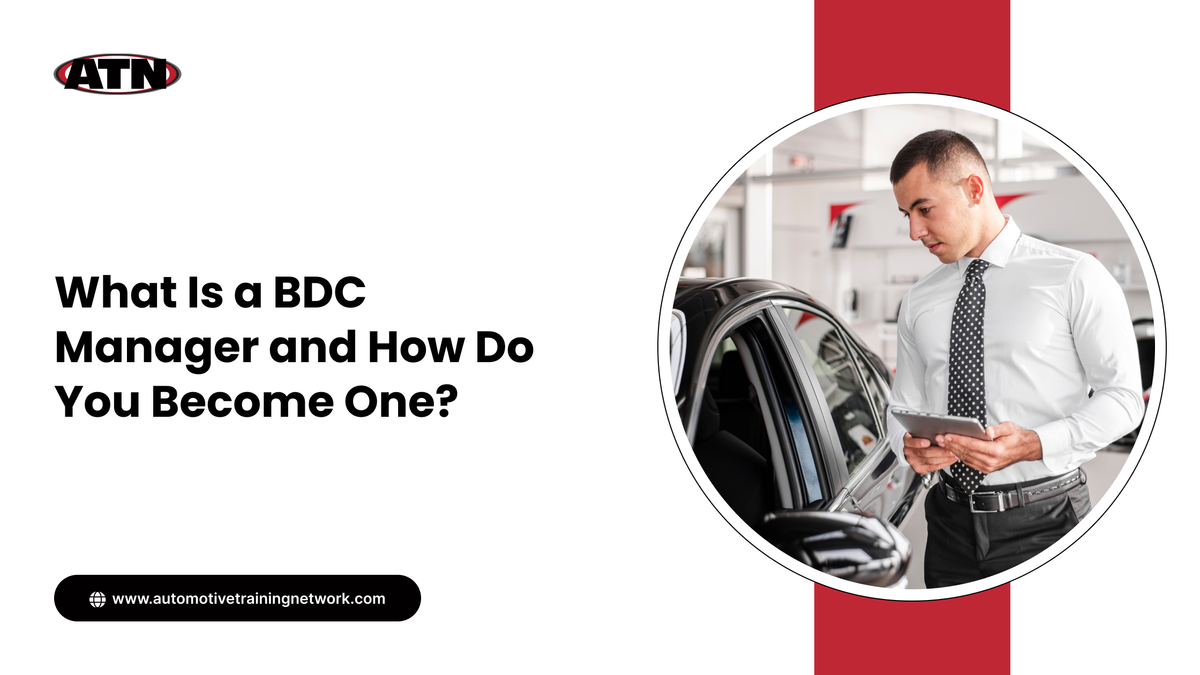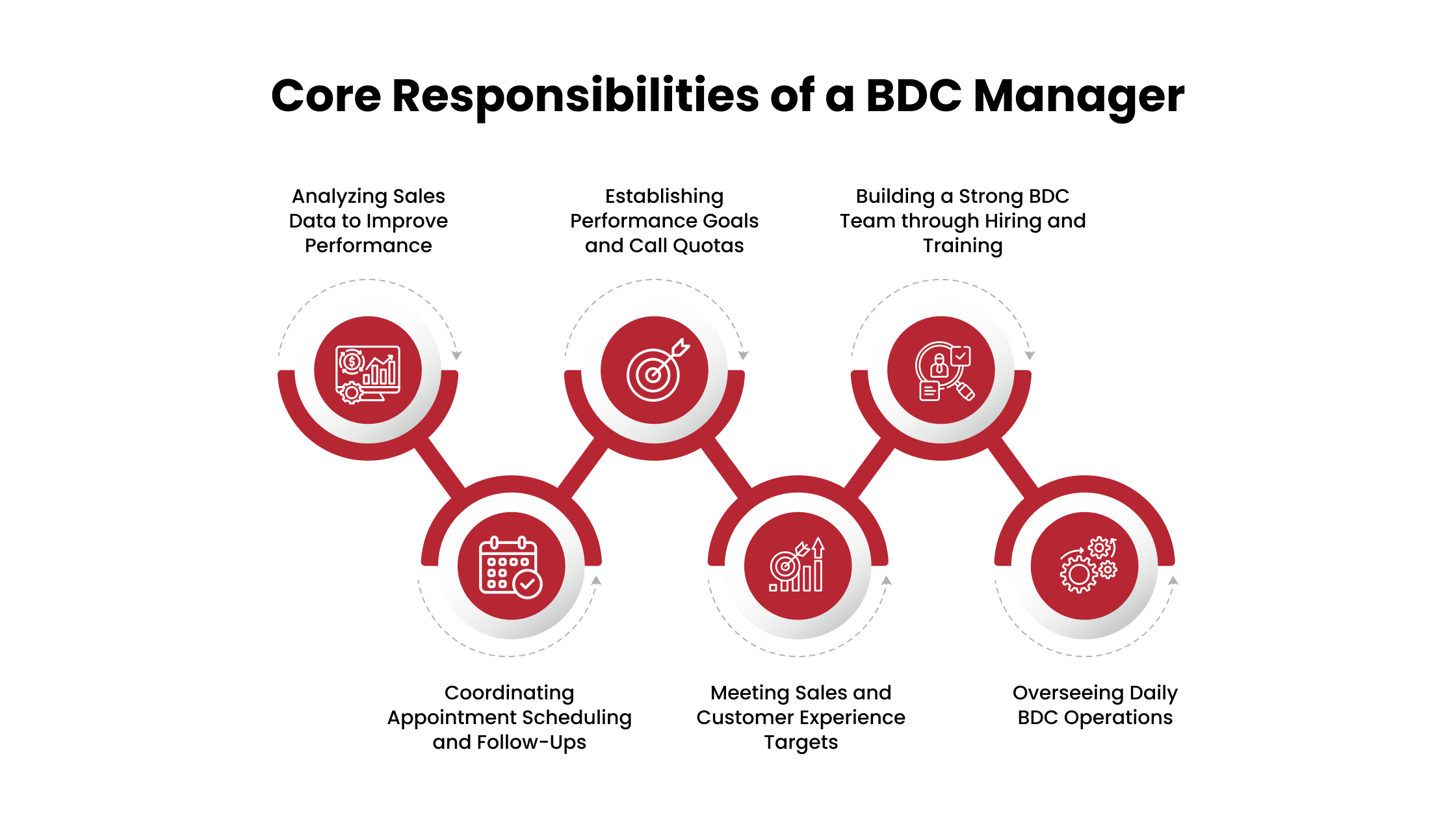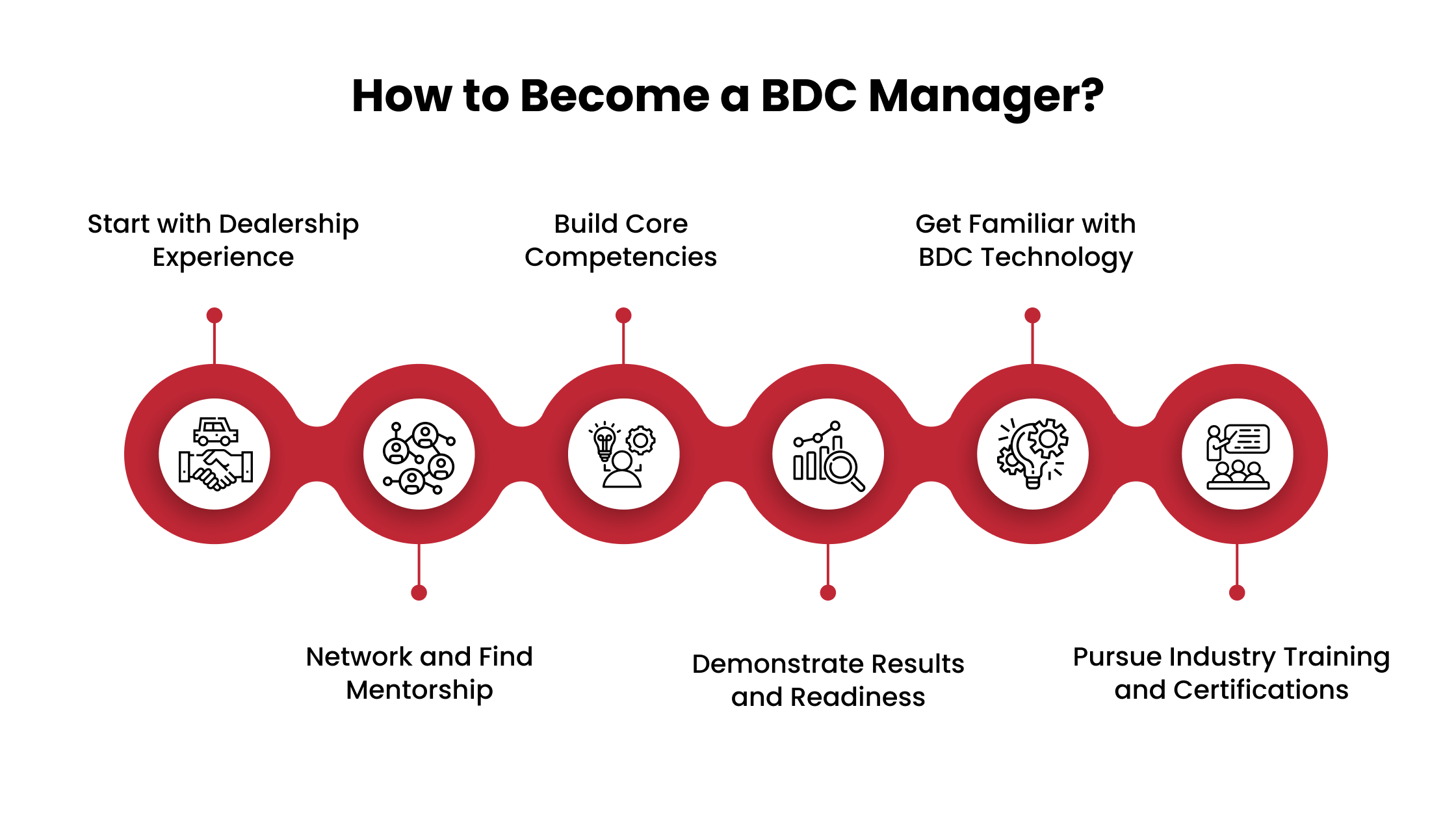What Is a BDC Manager and How Do You Become One?

Did you know that only one in three potential car buyers knows the exact vehicle they want to purchase? This means that a majority of 66% buyers can be influenced, especially at the earliest stages of their buyer journey.
This is where a dealership’s ability to engage, guide, and respond quickly becomes a serious advantage. A BDC Manager plays a vital role in making that happen.
In this blog, we’ll discuss what a BDC Manager is, what their day-to-day responsibilities look like, and how to pursue this career path. Whether you're aiming to step into the role or evaluating its impact on your dealership, this guide provides a clear view of what to expect and why this position matters more than ever.
What Is a BDC Manager?
A BDC Manager is responsible for overseeing the Business Development Center (BDC) of a dealership, which handles all inbound and outbound communications related to sales and service leads. The primary goal of the BDC Manager is to ensure that potential buyers are engaged effectively and transitioned smoothly into the dealership’s sales process.
This role is not customer-facing in the conventional sense, but it is central to generating showroom traffic. A BDC Manager supervises a team of BDC representatives who respond to leads via phone, email, chat, and sometimes SMS. They monitor appointment-setting metrics, ensure lead follow-ups are completed on time, and analyze data to improve conversion rates.
What sets a strong BDC Manager apart is their ability to apply structured processes to lead management while coaching their team to maintain quality communication. Their daily work includes:
- Setting performance goals for BDC agents
- Reviewing CRM data for follow-up accuracy
- Training the team on scripts, objection handling, and call flow
- Aligning closely with the sales and service departments
- Reporting on lead sources, conversion rates, and appointment show rates
Understanding what a BDC Manager is includes recognizing their role as the dealership’s frontline for lead capture and engagement, often influencing buyer decisions long before the first in-person meeting.
Core Responsibilities of a BDC Manager

The BDC Manager bridges the gap between digital engagement and showroom sales by overseeing how leads are handled, nurtured, and converted. A well-run BDC contributes directly to higher appointment show rates, better customer retention, and a more predictable sales pipeline.
Below are the core responsibilities that define this role:
1. Building a Strong BDC Team through Hiring and Training
One of the most critical responsibilities of a BDC Manager is to build and maintain a capable team. This begins with identifying qualified candidates who have strong communication skills and a customer-first attitude.
Once hired, the BDC Manager is responsible for onboarding and training representatives, ensuring they understand dealership processes, phone etiquette, CRM usage, and appointment-setting protocols. Ongoing coaching is equally important to help agents refine their scripts, handle objections, and stay motivated. A well-trained BDC team has a direct impact on the dealership’s ability to engage leads and drive consistent results in both sales and service.
Specialized training programs, like those offered by Automotive Training Network, provide dealerships with targeted tools to enhance phone handling, objection management, and lead-nurturing skills, equipping BDC teams to perform at a higher level.
2. Establishing Performance Goals and Call Quotas
To keep the BDC team productive and aligned with dealership objectives, the BDC Manager must set clear, measurable performance goals. These often include call volume targets, appointment-setting quotas, and lead conversion benchmarks for both inbound and outbound activities.
Quotas are based on historical performance data and current business objectives. Regular monitoring and performance reviews ensure the team stays accountable and on track. More than just a numbers game, this practice helps maintain momentum, motivate agents, and ensure that every lead receives timely and professional follow-up.
3. Analyzing Sales Data to Improve Performance
Data analysis plays a critical role in how BDC Managers make decisions. They regularly review DMS reports and sales performance metrics to identify trends, gaps, and opportunities for improvement.
For example, if show rates are low for a specific lead source, the manager may revise scripts or retrain staff. If conversions drop, they might evaluate agent performance or refine follow-up timelines. These insights are used to adjust the team's strategy, optimize call handling, and enhance appointment quality. A data-driven approach allows the BDC to stay agile and support broader dealership goals more effectively.
4. Coordinating Appointment Scheduling and Follow-Ups
BDC Managers oversee the scheduling of sales and service appointments, ensuring accuracy and efficiency. This includes confirming availability with the relevant departments and ensuring that customer preferences are met. When customers miss appointments, it's the BDC Manager’s job to implement follow-up protocols to reschedule those visits.
By reducing no-shows and keeping the calendar full, they help maintain a steady flow of traffic to the dealership. Proper coordination also enhances the customer experience, demonstrating that the dealership values their time and is committed to delivering a seamless, professional process.
5. Meeting Sales and Customer Experience Targets
BDC Managers are responsible for achieving both sales and customer satisfaction benchmarks set by dealership leadership. These goals include increasing appointment show rates, improving lead-to-sale conversions, and enhancing overall customer experience scores. Achieving these targets requires balancing team performance, communication quality, and lead management discipline.
A successful BDC Manager aligns their team’s activity with dealership-wide strategies, contributes to revenue growth, and supports long-term customer loyalty. They act as a bridge between online inquiries and in-store experiences, making sure no lead is wasted and every customer is treated professionally.
6. Overseeing Daily BDC Operations
Managing the day-to-day activities of the business development center requires exceptional organizational skills. The BDC Manager ensures that all calls, emails, texts, and follow-ups are handled promptly and that CRM tasks are completed accurately. They monitor workflow, resolve operational issues, and maintain open communication lines between BDC staff and other departments.
The manager is also responsible for enforcing policies, updating scripts, and handling escalations as needed. By keeping operations running smoothly, the BDC Manager allows the dealership to maintain consistent customer engagement and meet daily business objectives without disruption.
What Does a BDC Manager’s Day Look Like?
While daily tasks may shift depending on the dealership’s size and setup, a BDC Manager is primarily focused on improving lead engagement, supporting their team, and aligning with sales and service goals. Collaboration across departments and active management of BDC reps are at the core of the role.
Much of the day is spent monitoring team performance and customer communications. BDC Managers regularly assess lead activity, evaluate appointment conversion rates, and identify areas that require support or process improvement. They also ensure that outreach aligns with ongoing marketing campaigns and dealership promotions.
Usual daily responsibilities include:
- Reviewing inbound and outbound call reports to assess agent performance
- Listening to recorded calls to identify quality gaps and coach reps accordingly
- Analyzing CRM data to prioritize follow-ups and spot high-intent leads
- Coordinating with sales and service teams on appointment scheduling and rescheduling
- Following up on marketing campaigns with personalized customer outreach
- Conducting one-on-one coaching or group training based on call reviews
- Evaluating overall team productivity and updating performance metrics
The role involves staying proactive, ensuring your team is responsive, aligned, and consistently driving high-quality customer interactions that move leads further down the sales pipeline.
Essential Skills and Qualities to Become a BDC Manager
A successful BDC Manager brings more than just automotive knowledge to the table. They need a balanced mix of leadership, analytical thinking, communication, and operational skills to drive measurable results. This role requires someone who can lead a team, engage with data, and ensure a consistent, high-quality customer experience across all touchpoints.
1. Automotive Experience
Having a solid background in the automotive industry is a significant advantage for a BDC Manager. Understanding vehicle sales cycles, dealership operations, and customer expectations allows managers to make informed decisions and provide relevant guidance to their teams.
This experience helps bridge the gap between the sales floor and the BDC, ensuring better alignment with overall dealership goals.
2. Call Center Experience
Since a BDC operates much like a call center, experience in managing inbound and outbound calls is crucial. Familiarity with call center technologies, customer interaction protocols, and performance metrics enables BDC Managers to oversee operations effectively.
This background also helps coaches guide agents in handling calls professionally and improving conversion rates.
3. Experience in Training and Managing Teams
Strong leadership includes the ability to train, motivate, and manage a team. Experience in developing training programs and conducting ongoing coaching is essential for maintaining agent performance. Effective managers foster a productive work environment, set clear expectations, and address challenges promptly to ensure consistent results.
4. Data-Driven Decision Making
This is not a role that can be run on instinct alone. BDC Managers should be able to interpret CRM and call tracking data, identify patterns in lead behavior, and make informed decisions based on performance metrics. Being comfortable with KPIs and reporting is essential to optimizing conversions and resource allocation.
5. Effective Communication
Clear, professional communication is critical, both internally with team members and externally with customers. BDC Managers must ensure agents follow consistent scripts while also adapting their tone and language to match the customer’s needs. Written and verbal communication skills have a direct impact on how the dealership is perceived.
How Can a BDC Manager Boost Sales and Enhance Customer Satisfaction?
A BDC Manager plays a vital role in improving sales and customer satisfaction through a variety of focused strategies:
- Develop Training Programs: Create comprehensive training initiatives to improve team skills and deepen product knowledge.
- Establish Sales Processes: Design and implement efficient sales workflows to enhance overall effectiveness.
- Monitor Performance Metrics: Track key performance indicators to identify areas for improvement.
- Provide Coaching and Feedback: Deliver regular guidance and constructive feedback to improve call quality and conversion rates.
- Analyze Customer Feedback: Gather and evaluate customer surveys to tailor services according to client needs.
- Collaborate Across Departments: Work closely with other dealership teams to ensure a smooth and positive customer journey.
How to Become a BDC Manager?

Breaking into a BDC (Business Development Center) Manager role isn’t always about formal education; it’s about a blend of hands-on dealership experience, understanding best BDC practices, strong leadership, and strategic communication skills. Here’s a step-by-step look at how to get there:
1. Start with Dealership Experience
Most BDC Managers begin their careers in foundational roles that offer exposure to dealership operations and customer engagement:
- Sales associate or customer service rep roles are common starting points.
- Working in internet sales or as a BDC agent can provide you with direct experience in lead follow-ups, CRM usage, and appointment setting.
- These roles teach you how to manage customer expectations and understand dealership workflows, which is critical for a future BDC Manager.
2. Build Core Competencies
To advance, you'll need to strengthen soft and technical skills that are essential for managing a BDC team:
- Leadership and coaching: You’ll guide BDC representatives, set goals, and resolve performance issues.
- Communication: Clear internal communication helps align your team with sales goals and customer service standards.
- CRM mastery: Familiarity with dealership CRM systems is essential.
- Analytical mindset: Ability to review KPIs like lead response time, appointment set rate, and show rate.
3. Get Familiar with BDC Technology
Modern BDCs rely on programs that streamline customer outreach and track team performance. Learn how to navigate:
- Call center software
- Texting and chat programs for dealership websites
- Appointment scheduling platforms
- Lead management dashboards
4. Network and Find Mentorship
Learning from experienced professionals can help fast-track your career:
- Attend industry conferences or dealer-specific training sessions.
- Join automotive groups on LinkedIn or dealer forums to connect with current BDC Managers.
- Ask for mentorship within your current dealership — shadowing a BDC Manager can help you understand what the role demands.
5. Demonstrate Results and Readiness
BDC leadership is a results-driven role. To be considered for promotion or hiring:
- Show how you’ve helped improve appointment rates or customer follow-up times.
- Take initiative by suggesting process improvements or CRM optimizations.
- Emphasize a data-driven approach to solving customer engagement problems.
6. Pursue Industry Training and Certifications
While a formal degree isn't always required, continuous learning shows initiative and deepens your industry expertise:
- Automotive training programs help you stay current.
- Consider certifications in sales management, digital marketing, or customer experience to round out your skills.
Some dealerships prefer candidates with degrees in business, marketing, or communications, but this is not always a deal-breaker. That’s why you should check out ATN, as it offers convenient virtual training tailored for dealership professionals.
Build a High-Performing BDC Team With Specialized Training from ATN

Effectively managing a Business Development Center demands expert training, tailored strategies, and ongoing support. Automotive Training Network (ATN) offers comprehensive BDC training programs that empower your team and transform your dealership’s sales results.
ATN’s proven approach equips you to build, manage, and lead a high-performing BDC that maximizes profitability and sets your dealership apart.
Our training encompasses essential skills, including phone handling, lead management, appointment scheduling, and effective sales strategies. Every aspect is customized to meet your dealership’s unique needs, ensuring your BDC becomes a critical driver of success.
Here’s how ATN can support your dealership’s BDC growth:
- Build a High-Performing BDC with focused training on phone skills, overcoming objections, and boosting conversion rates
- Tailor programs to your dealership’s specific challenges and goals for measurable improvement
- Develop strong appointment-setting and follow-up systems that keep your sales pipeline full
- Enhance your team’s ability to nurture leads and increase customer retention
- Motivate your staff through adequate compensation and performance evaluation techniques
- Transform your BDC from a cost center into a profitable, results-driven department
Shift your BDC from average to exceptional. Learn from the pioneer of BDC training, Tom Stuker, and position your dealership for lasting success.
